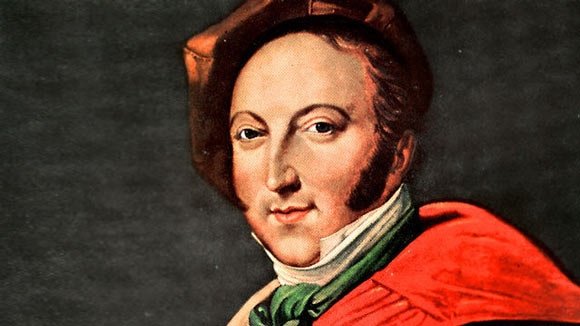
Gioachino Rossini was born in a family of musicians in Pesaro on February 29, 1792. His father, Giuseppe, was an inspector in slaughterhouse while his mother, Anna, was a notable singer. He had already begun his musical career in his early childhood. By the age of six, he was already playing the triangle in his father’s musical group. At the age of 14 he entered Bologna’s Philharmonic School and composed his first opera seria—Demetrio e Polibio. At 15, he could already play number of instrument and had made some public appearances to earn reasonable fortune.
In 1799, Rossini’s father was sent to prison for one year on supporting French revolution. His mother then took him to Bologna where she earned her fortunes by singing for various theaters. There he played harpsichord under Giuseppe Prinetti directions for the next three years, who was a musician as well as owned a business of selling beer. Later he started working for blacksmith named Angelo Tessie, under whose coaching he learnt to play piano and made his first public appearance. In 1805, at the theatre of the Commune in Ferdinando Paer’s Camilla, he made his first official public appearance as a singer. In 1806, he became cello student and was admitted to counterpoint class of Padre Stanislao Mattei and learned to play cello with ease but the academic asperity of Mattei’s views on counterpoint served only to drive the young composer’s views toward a freer school of composition.
He produced his first opera, La cambiale di matrimonio, when he was only 18 years old. In 1813, the young composer gained international fame for producing Tancredi and L’italiana. He established himself as graven image of Italian opera. He continued to write operas for Venice and Milan during the next few years but never received the response he expected. In 1815, he retired to his home in Bologna and started working for Domenico Barbaia to compose one opera per year for 200 ducats per month.
The Barber of Seville was Rossini’s greatest accomplishment. Rossini’s Barber is one of the greatest masterpieces of comedy within music. He produced 20 operas between 1815 and 1823. In 1822, he went to Vienna and performed many operas in German. In the same year, he then married the famous singer Isabella Colbran, who starred in many of his operas. When he stopped receiving appreciation from the local audiences he stop writing for his native country and moved to England where he was royally welcomed and received good fortunes for his performances. He then worked for the Theater Italian as musical director and wrote his last two operas Le Comte Ory and Guillaume Tell.
In 1845, after Isabella death, Rossini married Olympe Pélissier. In 1846, he modified some of his old operas for the newly appointed Pope, Pius IX. Sadly his health continued to decline and he was later diagnosed with cancer in 1868. He then went through two surgeries and was expected to return to his full health but he could never fully regain his health. He died on November 13, 1868 in Passy and was buried in Paris. Thousands of mourners attended his funeral. Later at Olympe’s request, his remains were relocated to Florence.
Some of the major and most accomplished work of Gioachino Rossini includes William Tell, Thieving Magpie, The Barber of Seville, The Italian Girl in Algiers and The lady of the lake.